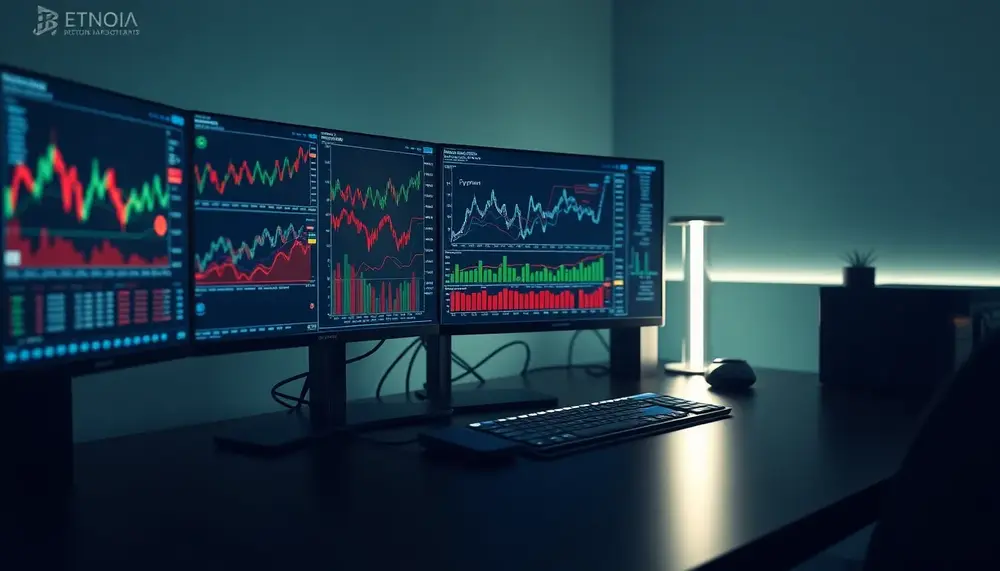Bitcoin mining
Bitcoin mining
What is Bitcoin Mining?
Bitcoin mining is the process by which new bitcoins are entered into circulation. But it's more than just creating new coins; it's also a critical component of the maintenance and development of the blockchain ledger. Mining involves using specialized computers to solve complex mathematical problems. When these problems are solved, the miner is rewarded with bitcoin, which they can then trade, hold, or sell.
How Does Bitcoin Mining Work?
Miners use powerful computers to complete complex mathematical calculations known as hashes. The first miner to solve the hash starts a new block on the Bitcoin blockchain. This verification of transactions builds security in the network. As a reward for their efforts, miners receive newly created bitcoins and transaction fees from the payments they confirm.
Equipment Required for Mining
To begin Bitcoin mining, you need powerful hardware. Early in Bitcoin's history, you could mine using a regular computer. But now, you'll need a specialized rig, often called an ASIC (Application-Specific Integrated Circuit). These devices are designed specifically for mining and can process huge amounts of data quickly. Mining also requires a lot of electricity, making energy costs an important factor to consider.
Growth and Profitability
Bitcoin mining can be very profitable. However, as more miners join the network and create more competition, the complexity of mining increases. This complexity, combined with fluctuating Bitcoin prices and high operating costs, means miners need a long-term mindset and strategic planning for success. The growth aspect involves reinvesting profits into better equipment, considering alternative energy sources, and staying updated with blockchain technology developments.
Mindset and Approach
A growth-oriented mindset is pivotal for miners. Successful miners view the activity as a business and make calculated decisions. Risks are inherent, but by staying informed about technology and market trends, and operating efficiently, there is potential for significant returns. The successful miners are those who adapt to changes and persist despite the challenges.
The Importance of Bitcoin Mining
Bitcoin mining not only generates income for miners but also underpins the security and integrity of the Bitcoin network. This decentralized process eliminates the need for a central authority, empowering individuals and promoting financial freedom. As Bitcoin continues to gain recognition globally, the role of mining in facilitating this growth becomes ever more important.
Conclusion
Bitcoin mining is at the core of the Bitcoin network's function and growth. It rewards participants, fosters a secure transaction environment, and requires a balance of technical knowledge, strategic investment, and a resilient mindset. Whether you're interested in the financial aspect of Bitcoin or the technological innovation it represents, mining remains central to understanding this digital currency's success.
Blog Posts with the term: Bitcoin mining

Bitcoin mining is central to its deflationary design, with milestones like the Genesis Block and halving events shaping its scarcity and market dynamics. Halvings reduce miner rewards approximately every four years, controlling supply while influencing Bitcoin's value and sustainability as...

Bitcoin mining involves solving complex mathematical problems using powerful computers, rewarding miners with new bitcoins and ensuring network security. The industry is evolving with advancements in hardware, a shift towards renewable energy sources, and regulatory changes impacting operations globally....

Bitcoin mining introduces new bitcoins into circulation and maintains the blockchain ledger by solving complex mathematical problems. Miners use specialized hardware for these calculations, ensuring network security and decentralization while being rewarded with newly minted bitcoins and transaction fees....

Bitcoin is a type of cryptocurrency that operates on blockchain technology, which is a decentralized ledger ensuring secure and transparent transactions. Blockchain's decentralization eliminates intermediaries like banks, providing enhanced security, transparency, lower costs, faster transaction speeds, immutability, and resilience against...

Bitcoin mining on Linux offers flexibility, stability, and security, making it ideal for both beginners and advanced users. With the right hardware, distribution (like Ubuntu or MinerOS), and software (such as CGMiner or EasyMiner), miners can optimize performance while ensuring...

The article explores Bitcoin's market trends, historical performance, and unique features like decentralization and limited supply, highlighting its potential as a mainstream financial asset amid increasing institutional adoption and inflation concerns....

Bitcoin, a decentralized digital currency created in 2009, contrasts sharply with the US Dollar, a traditional fiat currency regulated by the Federal Reserve. While Bitcoin offers advantages like decentralization and transparency, it faces challenges such as regulatory uncertainty and market...

Bitcoin's rebound past $100,000 after a weekend drop highlights its volatility and resilience, driven by institutional interest and macroeconomic factors like tariff policies. Meanwhile, Marathon Digital navigates mining challenges while expanding capacity, as global crypto adoption accelerates amidst regulatory shifts...

Bitcoin is a leading cryptocurrency in Germany, with dynamic trading options and robust platforms supporting both short-term trades and long-term investments within a well-regulated framework. The market's volatility presents opportunities for strategic investors who must navigate regulatory requirements, technological security...

Quantum Blockchain Technologies has integrated AI into bitcoin mining, claiming a 30% efficiency improvement, while questions about its real-world application persist. Meanwhile, discussions around Bitcoin's valuation and security continue amid market shifts and potential quantum computing threats....

Bitcoin mining in Pakistan is gaining interest due to low electricity costs and a tech-savvy population, but faces challenges like regulatory uncertainty and infrastructure gaps. With government initiatives and grassroots adoption growing, the country has potential to become a regional...

Bitcoin mining is essential for maintaining the Bitcoin network by solving cryptographic puzzles to validate transactions and introduce new bitcoins, requiring significant computational power and specialized hardware in a competitive environment....

Bitcoin mining difficulty measures how hard it is to find a new block, adjusting every two weeks based on the network's computational power to maintain consistent 10-minute intervals between blocks. This self-regulating mechanism ensures network stability and security, impacting miners'...

The Bitcoin Miner S19 XP Calculator is a specialized tool designed to optimize mining profitability by factoring in variables like hash rate, electricity costs, and market conditions. Tailored for the Antminer S19 XP's advanced features such as high hash rate...

The blockchain sector is advancing rapidly, with UBS exploring Ethereum's ZKsync for digital gold expansion, Wyoming facing transparency issues in its stablecoin project, and companies like Argo Blockchain and DMG focusing on strategic growth despite challenges. These developments highlight innovation,...
